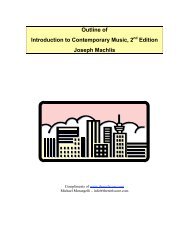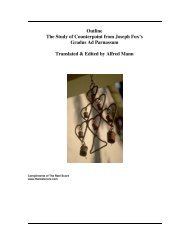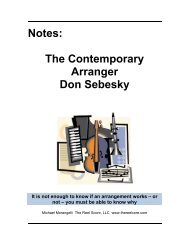An Outline of The History of Western Music Grout ... - The Reel Score
An Outline of The History of Western Music Grout ... - The Reel Score
An Outline of The History of Western Music Grout ... - The Reel Score
You also want an ePaper? Increase the reach of your titles
YUMPU automatically turns print PDFs into web optimized ePapers that Google loves.
2. Technical Achievements<br />
a) Codification <strong>of</strong> the rhythmic modal system<br />
b) Invention <strong>of</strong> a new kind <strong>of</strong> notation for measured rhythm<br />
3. Secular/sacred Orientation<br />
a) No clear distinction between sacred & secular styles had yet developed<br />
b) Beginning <strong>of</strong> 13th Century nearly all polyphonic music was sacred<br />
c) By end <strong>of</strong> century both secular and sacred texts were receiving polyphonic setting<br />
4. Trends at end <strong>of</strong> 13th Century<br />
a) Structure <strong>of</strong> Motet was beginning to expand<br />
b) Authority <strong>of</strong> the rhythmic modes gradually weakened<br />
c) Chant Tenor was relegated to a purely formal function<br />
d) Elevation <strong>of</strong> the triplum to the status <strong>of</strong> solo voice against the accompanying lower<br />
parts<br />
5. Road was open to a new musical style & a new way <strong>of</strong> composing which would look<br />
upon latter half <strong>of</strong> 13th Century as the antique & outdated way<br />
a) <strong>Music</strong> <strong>of</strong> Lèonin & Pèrotin as "ars antiqua"<br />
b) Forthcoming music <strong>of</strong> de Vitry in the 14th century would be "ars nova"<br />
IV. French & Italian <strong>Music</strong> in the 14th Century<br />
A. General Background<br />
1. A period <strong>of</strong> change and disruption<br />
a) <strong>The</strong> authority <strong>of</strong> the Catholic Church and the supremacy <strong>of</strong> the Pope was widely<br />
questioned<br />
(1) <strong>The</strong> engineered election <strong>of</strong> Clement V as Pope by King Philip IV <strong>of</strong> France<br />
(2) Rival claimants to the Papacy<br />
(3) Corrupt and <strong>of</strong>ten scandalous life <strong>of</strong> the higher clergy<br />
(4) Writings sharply critical <strong>of</strong> church affairs appeared<br />
(5) Rise <strong>of</strong> divisive & heretical movements that foreshadowed the Protestant<br />
Revolution<br />
b) Separation <strong>of</strong> between Church & State emerged as doctrines that are held today<br />
2. Social Conditions<br />
a) Growth <strong>of</strong> cities brought increased political power to the middle class<br />
b) Black Death & Hundred Years' War led to urban & peasant discontent<br />
c) <strong>The</strong> medieval ideal <strong>of</strong> European political unity gave way to the reality <strong>of</strong> separate,<br />
independent powers<br />
d) Literature, education, and the arts all turned from the relatively stable, unified,<br />
religiously centered viewpoint <strong>of</strong> the 13th Century toward worldly human concerns<br />
3. Change came as a gradual shift in emphasis, not a sudden reversal <strong>of</strong> values<br />
4. <strong>Music</strong><br />
a) <strong>Music</strong>ians consciously struck out in new directions<br />
(1) "Ars nova" - the French musical style during the first half <strong>of</strong> the 14th Century<br />
(2) Opponents & supporters recognized the change<br />
b) Old and New Arts disagreed on two points





